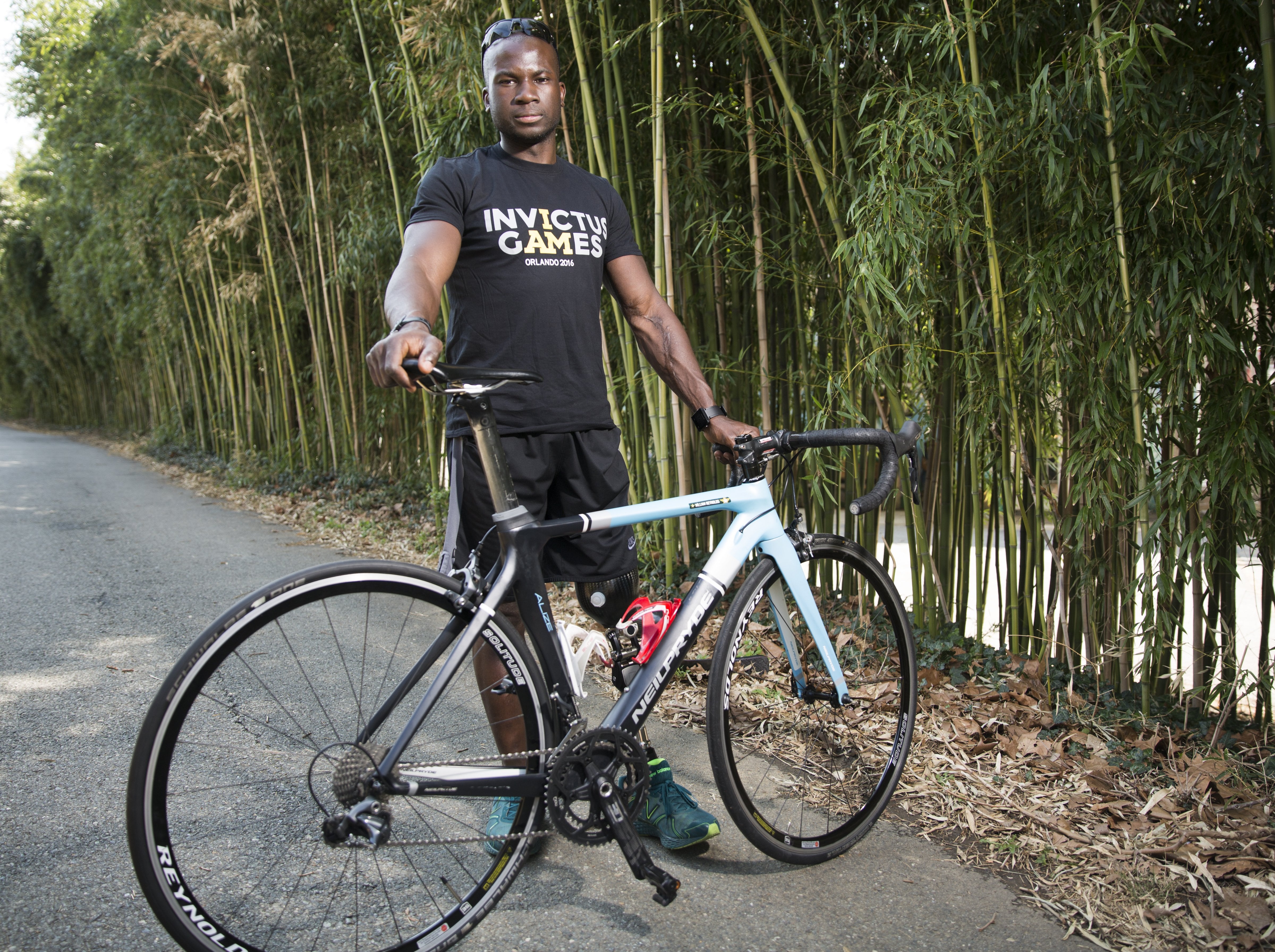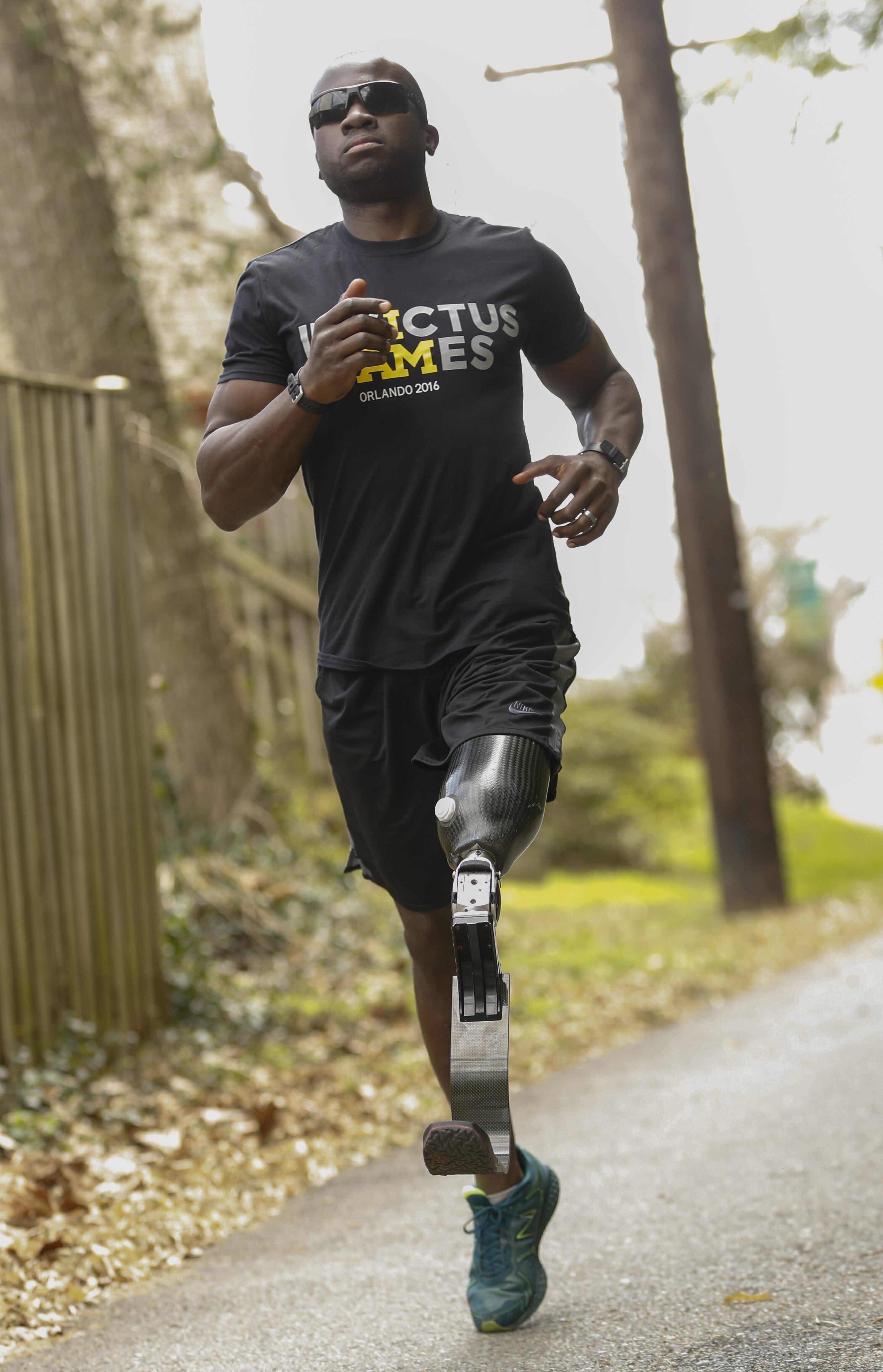The shrapnel from a roadside bomb in Iraq mangled the left leg of Army Capt. Will Reynolds in 2004 and ended his career as an infantry leader, but . A 2004 IED blast in Iraq ended former Army Capt. Will Reynolds’ infantry leadership role when shrapnel mangled his left leg. But later this spring, Reynolds, now medically retired, will lead U.S. service members and vets into a much different, more uplifting sort of contest.
infantry leadership role when shrapnel mangled his left leg. But later this spring, Reynolds, now medically retired, will lead U.S. service members and vets into a much different, more uplifting sort of contest.
In May, the new international athletic competition for wounded warriors will, for the first time, be held in the country that inspired it. Last week tThe team representing the U.S. was announced last week, and a team for which Reynolds will compete in multiple events and serve as captain.
The second Invictus Games will be held in Orlando, Florida, on May 8-12 , two years after the inaugural 2014 games in London. Prince Harry of Wales
, two years after the inaugural 2014 games in London. Prince Harry of Wales , who spent a decade in the British army, started the event games after the Colorado Warrior Games in 2013 inspired him to create an international version.
, who spent a decade in the British army, started the event games after the Colorado Warrior Games in 2013 inspired him to create an international version.
Reynolds said the inspirational nature of capacity of Warrior Games and other sports events for disabled service members Paralympic sports offers not only goals and motivation for the competitors, but also for many more service members who simply watch.
"It’s not only for us, competing amongst ourselves, for our countries, but also to motivate those individuals who have just recently been injured," Reynolds told Army Times. "Sitting in their bed at Walter Reed (medical center), they turn on ESPN, and see people injured a couple years ago out there doing great stuff."," Reynolds told Army Times.
This year, more than 500 athletes from 15 countries — up from 300 athletes and 13 countries in 2014 —(compared to about 300 from 13 countries in 2014) will compete in a variety of events: archery, cycling, indoor rowing, powerlifting, sitting volleyball, swimming, and track and field, as well as wheelchair versions of basketball, racing, rugby and tennis.
The U.S. will send about 115 athletes representing each service branch (15 more than in 2014). About half of this year's team competed in the first games, Reynolds estimated.
Reynolds won four bronze medals in the 100- and 200-meter sprints and two cycling events during the inaugural games. He expects the competition to stiffen be amplified with more athletes attending, but overall than last year. But he also said that overall it will be quite comparable.
"In terms of the level of competition and difference in the games, they did such a good job with the first one that there's not a ton of difference, other than the location," Reynolds said.
There will be aA third round of Invictus Games is planned for in September 2017 in Toronto, according to the games' website.

Reynolds said that inspirational nature of sporting competitions for wounded warriors offers not only goals and motivation for competitors, but many more wounded service members who simply watch.
Photo Credit: Mike Morones/Staff
Team USA
Beyond the remarkable nature of the delegation as a whole, Team USA will send a number of notable athletes to the Walt Disney ESPN Wide World of Sports Complex in less than two months:
• Staff Sgt. Robert Brown, who lost his right leg to gunshot wounds in Iraq in 2006, has also achieved substantial success in para-athleticsParalympic sports since taking them up in 2009. In 2015 he won a gold medal in the 100-meter dash at the Military World Games and silver in the 200. (It was the first time that the much larger event, held on a quadrennial basis since 1995, held exhibitions for adaptive sports Paralympic competitors.)
who lost his right leg to gunshot wounds in Iraq in 2006, has also achieved substantial success in para-athleticsParalympic sports since taking them up in 2009. In 2015 he won a gold medal in the 100-meter dash at the Military World Games and silver in the 200. (It was the first time that the much larger event, held on a quadrennial basis since 1995, held exhibitions for adaptive sports Paralympic competitors.)
Reynolds, the team captain, said his role has been to help act as a liaison between coaches and organizers and the athletes and keeping them coordinated and motivated. He said his Army leadership experience is "directly transferable," especially since he's still leading service members and vets.
"That’s one of the good things about leading a team like this," he said. " Because eEverybody is a former service member or current one, so they are all pretty autonomous and know the right things to do. Everyone has that collective mindset, the cohesiveness is already forming." Reynolds said.
At the inaugural Invictus Games, at first there was at first a sense of uncertainty in the air as no one quite knew what to expect. But eventually, he said, the mood atmosphere shifted and camaraderie blossomed, a phenomenon he expects will carry over to the second iteration.
"As the (2014) event went on, you just realized how many great the people were there from different countries, how great the event was," Reynolds said. "People just came out of their shell and started to interact across teams. ," Reynolds said. "By the end of the event we were all riding the bus together, not team specific, communicating the best we could...It just all came together over that week."

An IED blast in Iraq sent shrapnel into Army Capt. Will Reynolds' left arm and leg in 2004. It took more than a dozen surgeries over five weeks until doctors said he'd keep both limbs. Then, after a car-on-bike accident a few years ago, his left leg had to be amputated at the knee.
Photo Credit: Mike Morones/Staff
A 'mark on the wall'
On Nov. 7, 2004, anAfter that IED blast sent shrapnel into Reynolds’ left arm and leg on Nov. 7, 2004,. The West Point grad has said the injuries were so bad his foot ended up on the front of his hip. F and, figuring he wouldn’t survive, the West Point grad told medics to help others. They disobeyed.
It took more than a dozen surgeries over five weeks until doctors said he’d keep both limbs for the foreseeable future, but not without difficulty. The range of motion in hHis leg was extremely limited, in range of motion and he had another 10 surgeries over the next several years. After a car-on-bike accident a few years ago caused additional damage, his leg was amputated at the knee.
The native of the Rochester, N.Y., area, who competed in gymnastics while at the academy, said the injuries and their aftermath led to a roller coaster of emotions.
"It swings all over the place," he said. "First you're just ... you wake up in bed, you're happy to be alive with whatever parts are there remaining. And then you start to go down into the dumps because you think yeah, I'm alive, but I'm not going to be able to do those things again. Then as you start to get function, you start to see people that were injured before you doing great, doing good things."
Reynolds had competed in the U.S.-based Warrior Games before earning his bronze medals in London during the inaugural games. He will compete in the 100-meter, 200-meter, 400-meter, 800-meter (if it's held) and 1,500-meter races, as well as both the road race and time trial cycling event. His times are better than they were two years ago, but he knows more competitors could raise the bar. Ultimately, he said, he's trying to run personal bests and let everything take care of itself.
He said the targets and goals of athletic competition help people, injured or otherwise, become more efficient and successful. That's especially important for people struggling with new physical realities and hoping to stretch limitations.
"I know with rehabilitation, therapists always put that mark on the wall for you to strive for," Reynolds said. "Recreational therapy and adaptive athletics just provide a new mark on the wall. The Warrior Games and Invictus Games, that's just yet another mark beyond recreational activity."




